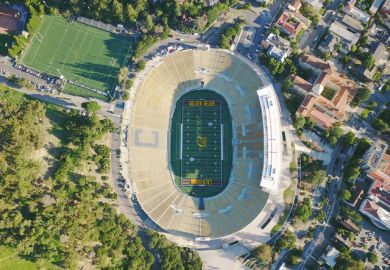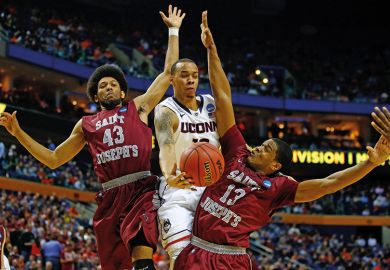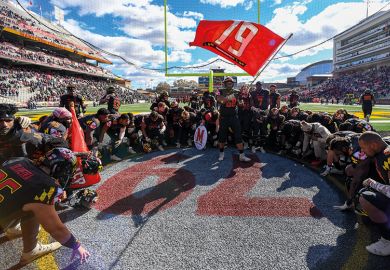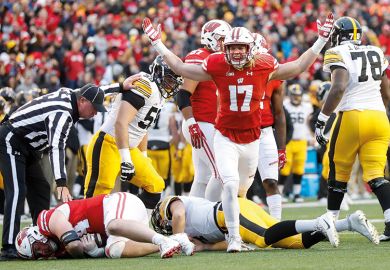Less than a month after California sparked a nationwide rebellion, the governing body of US college sports has backed down and agreed to find ways to let student athletes profit from outside publicity.
The National Collegiate Athletic Association, in a unanimous vote by its board of governors, agreed that it would develop policies that would allow college athletes to earn money from uses of their “name, image and likeness”.
In a reversal of its long-standing position, the NCAA’s leadership acknowledged the pressure it felt from California’s enacting a law on 30 September that would grant that basic right to its student athletes starting in 2023, as well as from lawmakers in at least a dozen other states pursuing similar measures.
“We must embrace change to provide the best possible experience for college athletes,” Michael Drake, the president of Ohio State University and chair of the NCAA board, said after its vote.
“Additional flexibility in this area can and must continue to support college sports as a part of higher education,” said Professor Drake, a former chancellor of the University of California, Irvine.
In its initial reaction to the California law, the NCAA threatened to evict the state’s higher education institutions from its leagues, and its president, Mark Emmert, called the law an “existential threat” to the collegiate model of amateurism.
Reform advocates, however, have long spoken of the fundamental unfairness of the NCAA making an estimated $1 billion (£780 million) a year, with top college coaches paid millions of dollars apiece, while even star athletes – often from ethnic minorities in the highest-revenue sports of football and basketball – were limited to scholarships.
One major milestone on the pathway towards the NCAA’s decision was the 2009 lawsuit by Ed O’Bannon, a former basketball star at the University of California, Los Angeles, that demanded that players be granted the right to profit from the use of their images. Mr O’Bannon won at the trial level, but after appeals, the NCAA was required only to offer full scholarships to athletes.
The final boundaries of the NCAA’s new position remain unsettled as the association gave itself until early 2021 to fully develop and implement its promised rule changes. The author of the California law, Nancy Skinner, a Democratic state senator, said on Twitter that she was concerned about ambiguity in the NCAA’s pledge to apply an undefined “collegiate model” in those new rules.
And in Washington, a Republican US senator, Richard Burr of North Carolina, promised to retaliate by pursuing legislation that would require college scholarships to be treated like income for any students who chose to reap earnings from their names and images.
Register to continue
Why register?
- Registration is free and only takes a moment
- Once registered, you can read 3 articles a month
- Sign up for our newsletter
Subscribe
Or subscribe for unlimited access to:
- Unlimited access to news, views, insights & reviews
- Digital editions
- Digital access to THE’s university and college rankings analysis
Already registered or a current subscriber?








